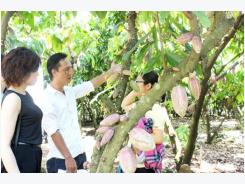Japanese capital poured into intensive farming in Vietnam

The number of Japanese investors who want to develop agriculture and fishery projects in Vietnam is on the rise as more Vietnamese favor Japanese food items.
One kilo of Japanese grapes is sold at over VND1 million in large cities in Vietnam. Despite the sky high prices, it still has been selling like hot cakes in the last two months.
Vietnamese consumers have also been hunting for Yoshimoto mushroom, which can be eaten raw because it is safe and fresh. The product, made by a Japanese company in Lam Dong province in Vietnam, also has very high selling price of VND500,000 per kilo at minimum.
Their products from farms in Vietnam sell well in the country, but also could be exported back to Japan with a preferential export tariff of zero percent under the TPP Agreement.
Analysts said the new policy of Japanese Prime Minister Shinzo Abe, under which agriculture would be developed into one of the key export sectors in the next three years, will force the country to take more drastic measures to increase farm produce supply to satisfy demand for domestic consumption and export.
The number of Japanese investors who want to develop agriculture and fishery projects in Vietnam is on the rise as more Vietnamese favor Japanese food items.
Vietnam has every reason to welcome the Japanese investment wave in agriculture. About 70 percent of Vietnamese population works in agriculture, fisheries and forestry production which makes up 20 percent of the country’s GDP.
Its soil and weather conditions are suitable for agriculture development. Meanwhile, its geographical position allows to connect easily with neighboring markets such as ASEAN and China.
According to JICA, the number of Japanese enterprises which want to develop agriculture projects in Vietnam has been increasing rapidly.
OTA Kaki has a project to develop a high-quality flower market with an effective distribution network in Lam Dong province. Also in the province, Nikko Foods is implementing a $822,000 project on developing high-quality tomatoes.
However, analysts pointed out that Japanese investment in Vietnam’s agriculture remains modest: 35 Japanese enterprises have invested $234 million in the sector so far.
Explaining the Japanese investors’ reluctance, Nguyen Anh Minh from MARD said the long-term investment and lower investment efficiency compared with investments in industry are major risks. Meanwhile, the low productivity and quality of Vietnam’s production, and problems in supply chains in Vietnam also make them hesitant to invest.
Japan cooperates with Vietnam in agriculture production via the Payroll Outsourcing model. Japanese companies invest in Vietnam and hire local workers to implement the projects. With the model, Vietnamese outsourcing companies can learn about their experiences, improve skills and receive technology transfer.
Related news
Tools

Phối trộn thức ăn chăn nuôi

Pha dung dịch thủy canh

Định mức cho tôm ăn

Phối trộn phân bón NPK

Xác định tỷ lệ tôm sống

Chuyển đổi đơn vị phân bón

Xác định công suất sục khí

Chuyển đổi đơn vị tôm

Tính diện tích nhà kính

Tính thể tích ao




 Farmer and inventor of coffee machine recognized by…
Farmer and inventor of coffee machine recognized by…  Farming start-ups need more help
Farming start-ups need more help